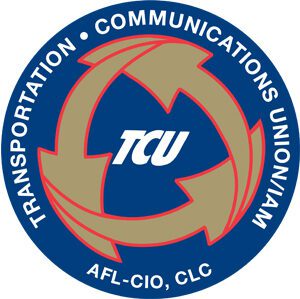After months of negotiations, the U.S. House of Representatives passed the Infrastructure Investment and Jobs Act (IIJA) – aka the “Bipartisan Infrastructure Deal” – and sent it to President Biden for his signature. The bill is a $1.2 trillion investment in our nation’s future, and includes numerous of provisions that will positively impact TCU members and their careers.
Below is a summary of the provisions impacting TCU members:
Rail Funding
The IIJA provides extremely strong rail funding, particularly on the Amtrak side. In addition to nearly doubling Amtrak’s annual authorization, the bill also provides the following historic funding in supplemental appropriations:
- $6B for Northeast Corridor Grants
- $16B for the National Network
- $36B for Fed-State Partnership for Intercity Passenger Rail, with $24B set aside for the Northeast Corridor
- $5B for CRISI
- $3B for Railroad Crossing Elimination Program
- $50M for Restoration and Enhancement
Amtrak Reforms – $66 Billion
The funding for Amtrak is more than Amtrak has received in all if its funding combined, according to Amtrak CEO Bill Flynn.
The IIJA included a number of Amtrak reforms that will strengthen the carrier and improve quality of service for riders:
- Requires Amtrak to staff station agent positions at stations that receive certain levels of traffic (Sec. 22203).
- Modifies Amtrak’s mission statement to better reflect the primary goal of providing quality service, eliminates harmful language on food and beverage revenues that stunted growth of on-board options and sought to ultimately reduce or eliminate on-board service (Sec. 22208 – the idea of TCU NVP Jack Dinsdale!).
- Creates a new food and beverage working group that includes labor participation.
- Prohibits contracting out of work of employees who can perform that work are currently furloughed (Sec. 22213).
- Supports Amtrak by making it more difficult for Congress to eliminate long distance routes (Sec. 22210).
- Addresses the safety of Amtrak and commuter rail employees by making employees who have been assaulted eligible for the attendant benefits of Critical Incident Stress Plans (Sec. 22424).
Transit Operator Assault
The IIJA takes historic steps to address transit operator assault by requiring the following actions:
For recipients of FTA funds, the transit operator must establish a safety committee that is made up of an equal number of frontline employee representatives and management representatives, which has responsibility for: identifying and recommending risk-based mitigations or strategies necessary to reduce the likelihood and severity of consequences identified through the agency’s safety risk assessment; identifying mitigations or strategies that may be ineffective, inappropriate, or were not implemented as intended; and, identifying safety deficiencies for purposes of continuous improvement.
Transit agencies must now report all assaults on transit workers to the NTD, defined as: “a circumstance in which an individual knowingly, without lawful authority or permission, and with intent to endanger the safety of any individual, or with a reckless disregard for the safety of human life, interferes with, disables, or incapacitates a transit worker while the transit worker is performing the duties of the transit worker.”
Rail Safety
The Precision Scheduled Railroading business model has extended train lengths up to three miles and compromised safety inspections by applying grueling metrics to rail employees – an issue our Carmen know all too well. The IIJA requires a National Academies study on the safety of trains longer than 7,500 feet, which present unique safety and training challenges, as well as disrupting communities when behemoth trains block grade crossings. IIJA also requires FRA accident reports to include information on train length and number of cars, as well as the size of the crew on board.
Additionally, it increases transparency for regulatory waiver requests, including suspensions of rules. Put together, these measures will help us better understand and address the impacts of train length and crew size on freight rail safety.
The IIJA also addresses accident and incident investigations by requiring DOT to create a process that better involves stakeholders, including rail labor representatives, in its investigations. The legislation also requires a quarterly report on failures and functions of Positive Train Control technology, including cutouts, malfunctions, and enforcements where an accident was actually prevented.
The IIJA does not have every provision TCU and rail labor pushed for. It does not include a reform of the Amtrak Board of Directors to provide a designated seat for rail labor. It does not include Railroad Yardmaster Hours of Service, nor does it address cross-border rail issues that have crept up in years past with regards to Mexican crews performing work of American railroad employees. TCU will continue to push to adopt these provisions in future legislation.
However, the IIJA is a MAJOR win for railroaders overall. The investments combined with the focus on safety will deliver real, tangible returns for TCU members in the years to come. TCU is proud of the work we did to influence this bill and the political support we utilized to push it across the finish line.
13 House Republicans Cross Aisle to Support Infrastructure
Lastly, many of TCU’s Republican friends in the House supported this legislation, going against their party’s leadership and the wishes of former President Trump. This showed intense political courage on their part, and we must show up for them at the ballot box. Those members that TCU has a history of supporting includes:
- Brian Fitzpatrick (PA-1st)
- Don Bacon (NE-2nd)
- Andrew Garbarino (NY-2nd)
- Nicole Malliotakis (NY-11th)
- John Katko (NY-24th)
- David McKinley (WV-1st)
- Chris Smith (NJ-4th)
- Don Young (AK-AL)
Other House Republicans that voted ‘yes’ include: Tom Reed (NY), Anthony Gonzalez (OH), Adam Kinzinger (IL), Jeff Van Drew (NJ), and Fred Upton (MI).

